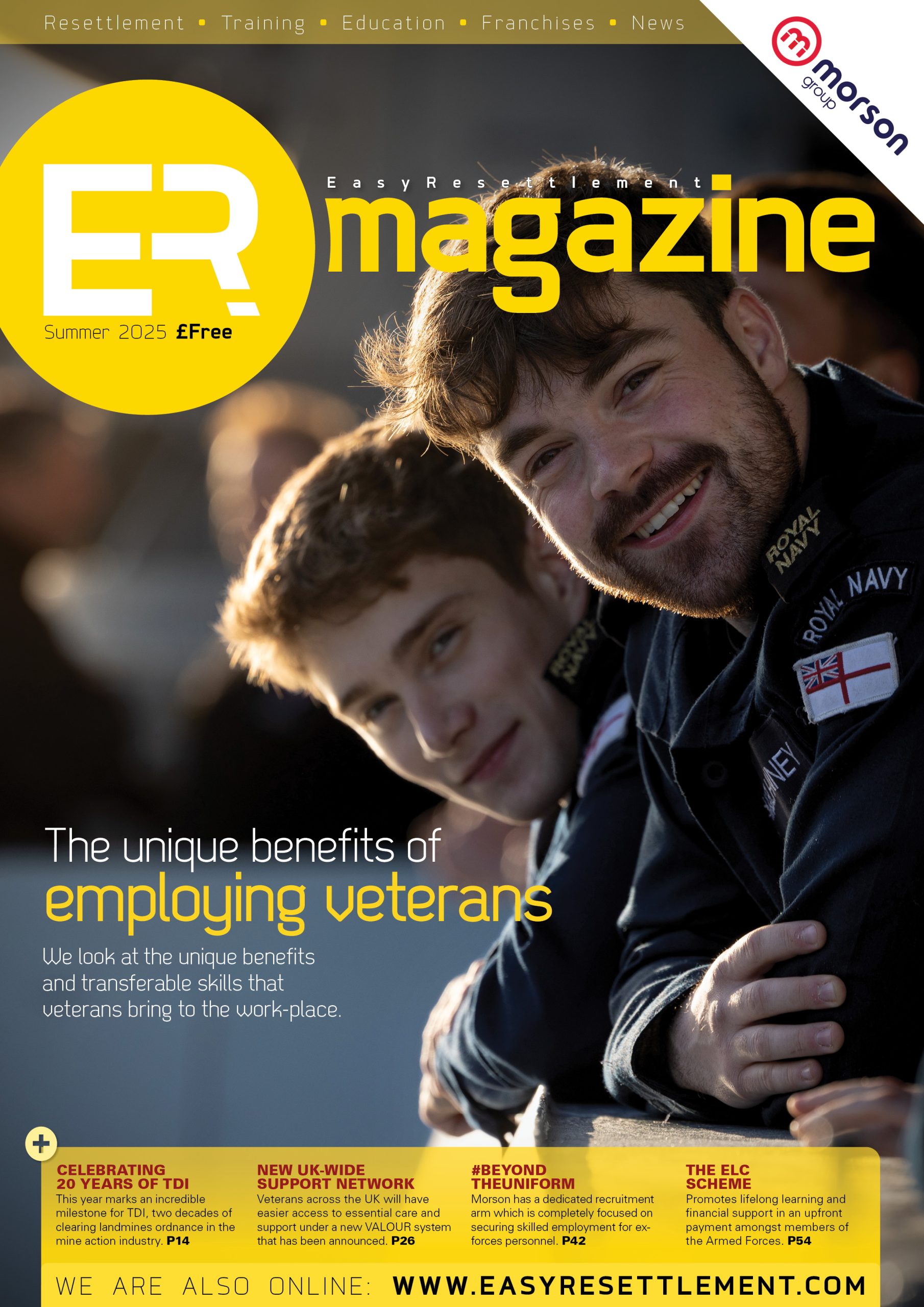Supporting the transition with RBLI’s LifeWorks programme
Transitioning from the Armed Forces into the civilian world is an intensive and challenging prospect for many servicemen and women.
Despite the continually improving support available, as provided by the Career Transition Partnership, life-altering mental and physical conditions established either during or after service can have a disastrous effect on veterans in almost every aspect of their lives.
Currently, working-age veterans in the UK are nearly twice as likely to be unemployed as their civilian contemporaries. This becomes worrisome when coupled with the understanding that 40% of veterans report suffering with a long-term health condition. However, with the help offered by the military charity sector in the form of employment, social and accommodation services, ex-service personnel can have their transition eased, and find firm footing on Civvy Street.
Military and disability charity Royal British Legion Industries runs a leading transformative employment support programme, LifeWorks, which directly tackles many of these issues faced by veterans in their search for work, making for a far smoother transition.
Developed by RBLI in 2011, LifeWorks is designed specifically to provide vital guidance and ultimately give the participants a sense of personal autonomy through the process of securing sustained employment.
RBLI’s head of vocational rehabilitation & training services Iain Downie, who leads the LifeWorks team, said the course can be a godsend for ex service personnel, altering their understanding of their own skills, potential and employability. “Over the course of the week, our vocational assessors and coaches redefine how the veterans perceive their own ability,” he says. “This is a vital process in helping them overcome many of the barriers they face both during and after their transition to the civilian world.”
The results gathered since the programme’s development have been extremely positive. An independent study, commissioned by the Learning and Work Institute in 2016, found that 83% of participants secure sustained employment, volunteering or training within 12 months of completing the course. This is a particularly impressive feat when considering that almost 80% of participants face challenges with disabilities or physical or mental health conditions.”
However, Royal British Legion Industries and its LifeWorks team recognise that it is not just those who are leaving the Armed Forces who require additional support. It is also vital that the families and partners of current servicemen and women receive support they need to find employment and feel a part of their local community, particularly when relocating regularly.
The high-skilled LifeWorks Families team are dedicated to building, through specific, tailored support, on the skills partners in the military community have already developed.
This support helps develop participants’ employability factor, through teaching them modern interview techniques, job searching skills, and CV formatting methods. The result of the intensive three-day course is an ability to better connect with the job market, the development of both short and long-term goals, and a set plan to help participants stay motivated in their search for employment. Following the course, participants are also able to take advantage of the ‘reachback’ advice programme which, for 6 months, will continue to offer guidance on any area which can aid them in securing sustained employment.
The LifeWorks Families team also offers remote support for the partners of servicemen and women, which is tailored to meet the specific demands of those in need who either can’t make the course or need only specific employment advice.
Nicola Ricketts left her own beauty therapy business in Devon to move to Middlesex with her husband after becoming an Army wife. “After spending 6 months as a full-time housewife, I decided that I needed to get my independence back and get a job,” she said.
“Having been self-employed for over 4 years, I had completely forgotten how to look for a job and didn’t really know what I wanted to do. By pure chance, the LifeWorks Families course popped up on my Facebook feed and I signed up immediately. It turned out to be the best thing I could have done.”
“The LifeWorks team is very passionate and dedicated to giving military spouses the tools to find a career, not just any-old-job. During the course we covered every aspect of finding employment and were taught how to highlight our skills and experiences to make us appealing to a potential employer. I was able to apply the skills we learned in my covering letter, CV, interview and follow up emails. I received positive feedback in all these areas from my new employer and I’m sure that this helped me to secure the role.
“I am now a Receptionist and Personal Assistant at an innovative beauty company. This is something I have aspired to do for a long time, but never had the confidence to apply for until I attended LifeWorks. We are so lucky to have such a valuable course available to us. I would not hesitate in telling anyone to take full advantage of the opportunity to attend this course.”
Nicola and Paul are not alone. LifeWorks and LifeWorks Families are on the verge of reaching a total of 1,000 participants in its short 6-year history and RBLI has no intention of stopping there. Iain said: “RBLI and the LifeWorks team are committed to ensuring that thousands more veterans and their families reap the rewards of the course, secure employment and get their lives back on track.”
LifeWorks graduate Colin’s story
Former Army Sergeant Colin Walker completed the LifeWorks course after his life fell apart.
“I knew who I was in the Army,” said Colin. “I was a very small cog in the military machine, but a cog nonetheless. However, when I came out I had absolutely no idea where I was and how I fit into society.
“In the civilian world there is no system – no hierarchy. There are no rules as such and for me, at the time, it appeared to lack order.
“In the military, if there is an issue with the system, there are ways to fix it. It wasn’t perfect, we all knew that, but we do know what works and what doesn’t; whereas when you leave, the lack of control of your own life is incredibly unsettling.”
Colin was fortunate enough to secure work for several years following his 17-year stint in the Army which saw him based around the UK and Europe. However, after spending three years setting up his own business as a freelance first-aid instructor, just before Christmas of last year, in a matter of weeks his world came crashing down.
“It was November 2016 when it all went horribly wrong for me.
“The business started to struggle and fall apart. I had my head above water – just. But then the vehicle I relied upon packed up. I quickly realised, all of a sudden, that everything was gone. I lost everything – my home, my business – everything.
“In the space of a month, my life had gone from something to nothing. I was worried for my wife and my two children who were both at school at the time. I was lost in a world I’d never been in before. My confidence was at rock-bottom and I was desperate for a fresh start.”
Then, by something which he refers to as ‘a pure stroke of luck’, Colin was given the details of LifeWorks by a local job centre. “What happened then changed my life.”
Naturally however, prior to attending a course in Colchester in January, Colin admits he was apprehensive. “I had no idea what to expect,” he said. “Because of what had happened in my life I was still in a cynical mind-set, but that changed, not just as the week progressed but as the first day progressed.”
“You could tell immediately that the LifeWorks team weren’t just there to turn up, get paid and go home. By the end of the first day I could see that was not going to be the case, and that made a big difference.”
“Within just the first couple of days, my confidence and the confidence of the others around me started to grow. By the end of that course – I had a CV I was impressed with, a clear idea of what I wanted to do, and the tools and knowledge of how to get there. The LifeWorks team really showed me how to sell myself in a way I couldn’t before.”
With his newfound sense of confidence Colin was once again eager to look for work. “After the course, I used what the team had taught me: I started refining my job searching.”
Within a month of finishing the course, Colin managed to secure an interview with SkillsForce – a national education charity who employ mostly ex-service personnel to lead teaching exercises in schools to empower children and young people to make positive life choices. His interview was successful which, he said, would not have happened if it was not for LifeWorks.
“I am entirely confident that I would not have secured this job if I hadn’t have attended that course and the first reason for that is because the employers would not have looked twice at my CV, the second for that is the interview techniques they taught us all. I knew the principles of basic interview techniques, but LifeWorks taught me how to put it into practice.
“LifeWorks has changed my life
– I wish I had done it years ago.”


Comments are closed, but trackbacks and pingbacks are open.